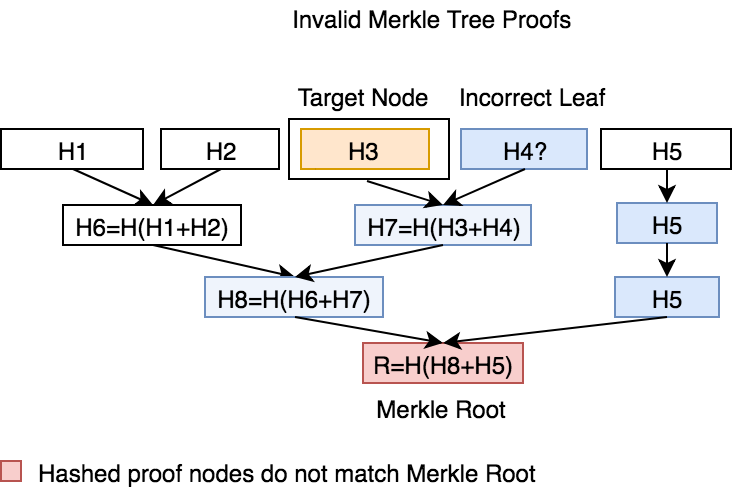
Security News
RubyGems.org Adds New Maintainer Role
RubyGems.org has added a new "maintainer" role that allows for publishing new versions of gems. This new permission type is aimed at improving security for gem owners and the service overall.
merkletreejs
Advanced tools
The merkletreejs package is a JavaScript library for constructing and verifying Merkle Trees. Merkle Trees are a fundamental component in blockchain technology and cryptographic applications, providing a way to efficiently and securely verify the integrity of data. This package allows you to create Merkle Trees, generate proofs, and verify proofs.
Creating a Merkle Tree
This feature allows you to create a Merkle Tree from an array of data. The example uses the keccak256 hashing algorithm to hash the data and then constructs the tree. The root of the tree is then printed.
const { MerkleTree } = require('merkletreejs');
const keccak256 = require('keccak256');
const leaves = ['a', 'b', 'c'].map(x => keccak256(x));
const tree = new MerkleTree(leaves, keccak256, { sortPairs: true });
const root = tree.getRoot().toString('hex');
console.log(root);Generating a Proof
This feature allows you to generate a proof for a specific leaf in the Merkle Tree. The proof can be used to verify that the leaf is part of the tree.
const leaf = keccak256('a');
const proof = tree.getProof(leaf);
console.log(proof);Verifying a Proof
This feature allows you to verify a proof against the root of the Merkle Tree. It checks if the provided leaf and proof match the root, ensuring the integrity of the data.
const isValid = tree.verify(proof, leaf, root);
console.log(isValid);The merkletree package is another library for creating and verifying Merkle Trees. It offers similar functionalities to merkletreejs but may have different API conventions and additional features.
The merkle-tools package provides tools for creating and managing Merkle Trees. It includes functionalities for creating trees, generating proofs, and verifying proofs, similar to merkletreejs. It also offers additional utilities for working with Merkle Trees.
The merkle-lib package is a lightweight library for creating and verifying Merkle Trees. It focuses on simplicity and ease of use, providing core functionalities similar to merkletreejs.

Construct Merkle Trees and verify proofs in JavaScript.
From NPM:
npm install merkletreejs
Available on jsDelivr CDN:
<script src="https://cdn.jsdelivr.net/npm/merkletreejs@latest/merkletree.js"></script>
https://lab.miguelmota.com/merkletreejs
Construct tree, generate proof, and verify proof:
const { MerkleTree } = require('merkletreejs')
const SHA256 = require('crypto-js/sha256')
const leaves = ['a', 'b', 'c'].map(x => SHA256(x))
const tree = new MerkleTree(leaves, SHA256)
const root = tree.getRoot().toString('hex')
const leaf = SHA256('a')
const proof = tree.getProof(leaf)
console.log(tree.verify(proof, leaf, root)) // true
const badLeaves = ['a', 'x', 'c'].map(x => SHA256(x))
const badTree = new MerkleTree(badLeaves, SHA256)
const badLeaf = SHA256('x')
const badProof = badTree.getProof(badLeaf)
console.log(badTree.verify(badProof, badLeaf, root)) // false
Print tree to console:
console.log(tree.toString())
Output:
└─ 7075152d03a5cd92104887b476862778ec0c87be5c2fa1c0a90f87c49fad6eff
├─ e5a01fee14e0ed5c48714f22180f25ad8365b53f9779f79dc4a3d7e93963f94a
│ ├─ ca978112ca1bbdcafac231b39a23dc4da786eff8147c4e72b9807785afee48bb
│ └─ 3e23e8160039594a33894f6564e1b1348bbd7a0088d42c4acb73eeaed59c009d
└─ 2e7d2c03a9507ae265ecf5b5356885a53393a2029d241394997265a1a25aefc6
└─ 2e7d2c03a9507ae265ecf5b5356885a53393a2029d241394997265a1a25aefc6
▾ Visualization of Merkle Tree

▾ Visualization of Merkle Tree Proof

▾ Visualization of Invalid Merkle Tree Proofs

▾ Visualization of Bitcoin Merkle Tree

See documentation (under docs/)
npm test
Q: How do you verify merkle proofs in Solidity?
Q: How do you verify merkle multiproofs in Solidity?
Q: Is there an NFT whitelist example in Solidity?
Q: Is there a CLI version of this library?
Q: Is there a way to visualize the merkle trees in the browser?
As is, this implemenation is vulnerable to a second pre-image attack. Use a difference hashing function for leaves and nodes, so that H(x) != H'(x).
Also, as is, this implementation is vulnerable to a forgery attack for an unbalanced tree, where the last leaf node can be duplicated to create an artificial balanced tree, resulting in the same Merkle root hash. Do not accept unbalanced tree to prevent this. More info here.
Please use the library @openzeppelin/merkle-tree if you're integrating with OpenZeppelin contracts or using multiproofs. There are known issues with the current multiproof implementation as pointed out in issues.
This library was created for my own purposes and is provided as-is. Use at your own risk.
Bitcoin mining the hard way: the algorithms, protocols, and bytes
Why aren't Solidity sha3 hashes not matching what other sha3 libraries produce?
What is the purpose of using different hash functions for the leaves and internals of a hash tree?
Pull requests are welcome!
For contributions please create a new branch and submit a pull request for review.
Many thanks to all the contributors that made this library better.
Released under the MIT license.
FAQs
Construct Merkle Trees and verify proofs
The npm package merkletreejs receives a total of 54,090 weekly downloads. As such, merkletreejs popularity was classified as popular.
We found that merkletreejs demonstrated a healthy version release cadence and project activity because the last version was released less than a year ago. It has 1 open source maintainer collaborating on the project.
Did you know?

Socket for GitHub automatically highlights issues in each pull request and monitors the health of all your open source dependencies. Discover the contents of your packages and block harmful activity before you install or update your dependencies.

Security News
RubyGems.org has added a new "maintainer" role that allows for publishing new versions of gems. This new permission type is aimed at improving security for gem owners and the service overall.

Security News
Node.js will be enforcing stricter semver-major PR policies a month before major releases to enhance stability and ensure reliable release candidates.

Security News
Research
Socket's threat research team has detected five malicious npm packages targeting Roblox developers, deploying malware to steal credentials and personal data.